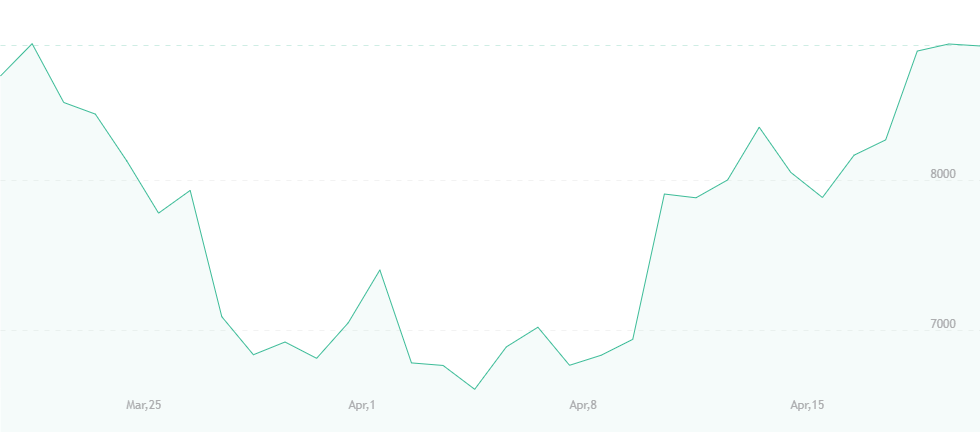At press time, bitcoin has swelled past the $8,900 mark, and it is expected to surpass $9,000 by early next week. Since yesterday, it has risen by over $100.
In addition, the cryptocurrency market has jumped from roughly $324 billion to $385 billion since April 16, marking a $60+ billion spike in less than seven days.
One of the reasons for the jump may be action occurring in South Korea. As a nation responsible for over one-quarter of the world’s cryptocurrency trades, South Korea usually sells digital assets at higher prices than neighboring countries like Japan, China and even the U.S., as they tend to be relatively scarce by comparison. Despite their popularity and high rates of use, virtual coins can be a little hard to obtain.
South Korea usually relies on China to supply and deliver coins, but the recent ban on foreign exchanges has led to troubled financial relations and a lagging crypto presence in the nation. This ultimately led many analysts to concur that bitcoin was headed into bear territory, but now prices seem to be returning to normal, with one bitcoin in South Korea trading for roughly $8,975. This is a positive sign that premiums in the country are being viewed in an optimistic light by investors.

The good news is that this behavior is also rubbing off on other coins. Ether, for example, has jumped by approximately 10 percent since the beginning of the week, while smaller altcoins like Storm, Aion, WanChain and ICON have all experienced gains nearing 20 percent, suggesting the cryptocurrency market is deep in bullish territory.
However, certain currencies are not out of the woods yet, and many – ether included – are in danger of potentially entering a downward spiral thanks to the SEC’s unwillingness to examine specific coins as “utility tokens” rather than “securities.”
The Venture Capital Working Group – a association of lawyers, investors and hedge fund managers – are appealing to the Securities and Exchange Commission to re-evaluate coins that have been distributed through Initial Coin Offerings (ICOs). Unlike Monero, bitcoin or even Litecoin, several virtual assets first introduced through ICOs do not have appropriate paperwork filed, nor are they offered through registered exchanges. Several of these assets are offered as payment methods for customers, and thus carry practical uses and qualify as “utilities” according to most investors.
The SEC sees things differently. To chairman Jay Clayton, every token registered or offered through an ICO qualifies as a security, and several subpoenas have been sent out to related cryptocurrency ventures to discuss the natures of the coins they offer – how they were originally marketed, offered, etc.
While ether is now largely decentralized and operates on a platform similar with that of bitcoin, the currency was originally distributed through “pre-sales,” which now stand as ICOs. If ether and other coins are hit with “security” tags, reclassification is imminent, making them subject to certain regulations that could bring their prices down drastically.
The Venture Capital Working Group is working with the SEC to get them to reverse these views. Though the organization boasts the support of “key players,” the SEC is proving slow to change its perspectives.

